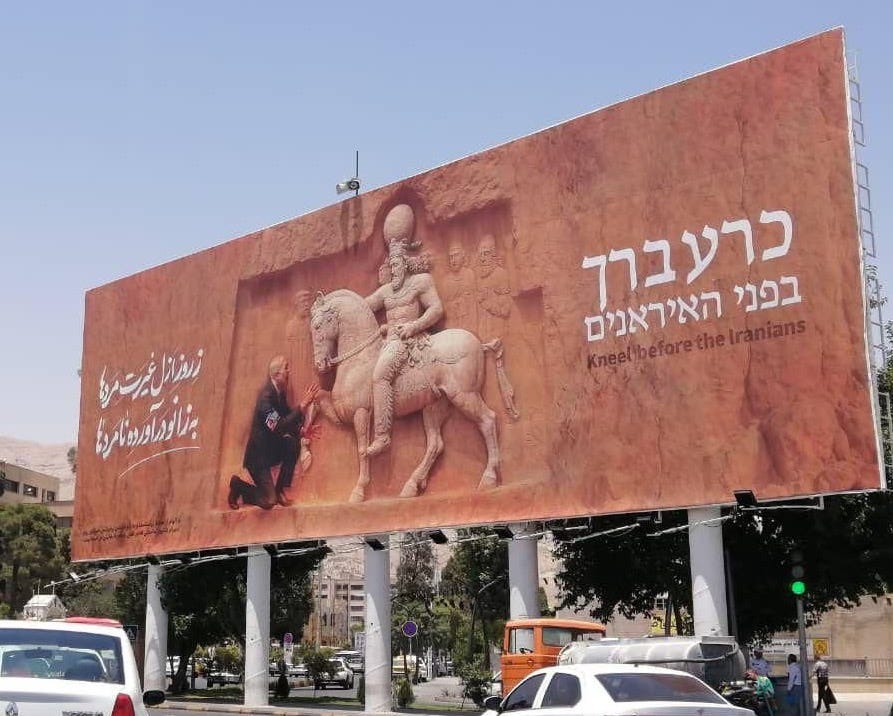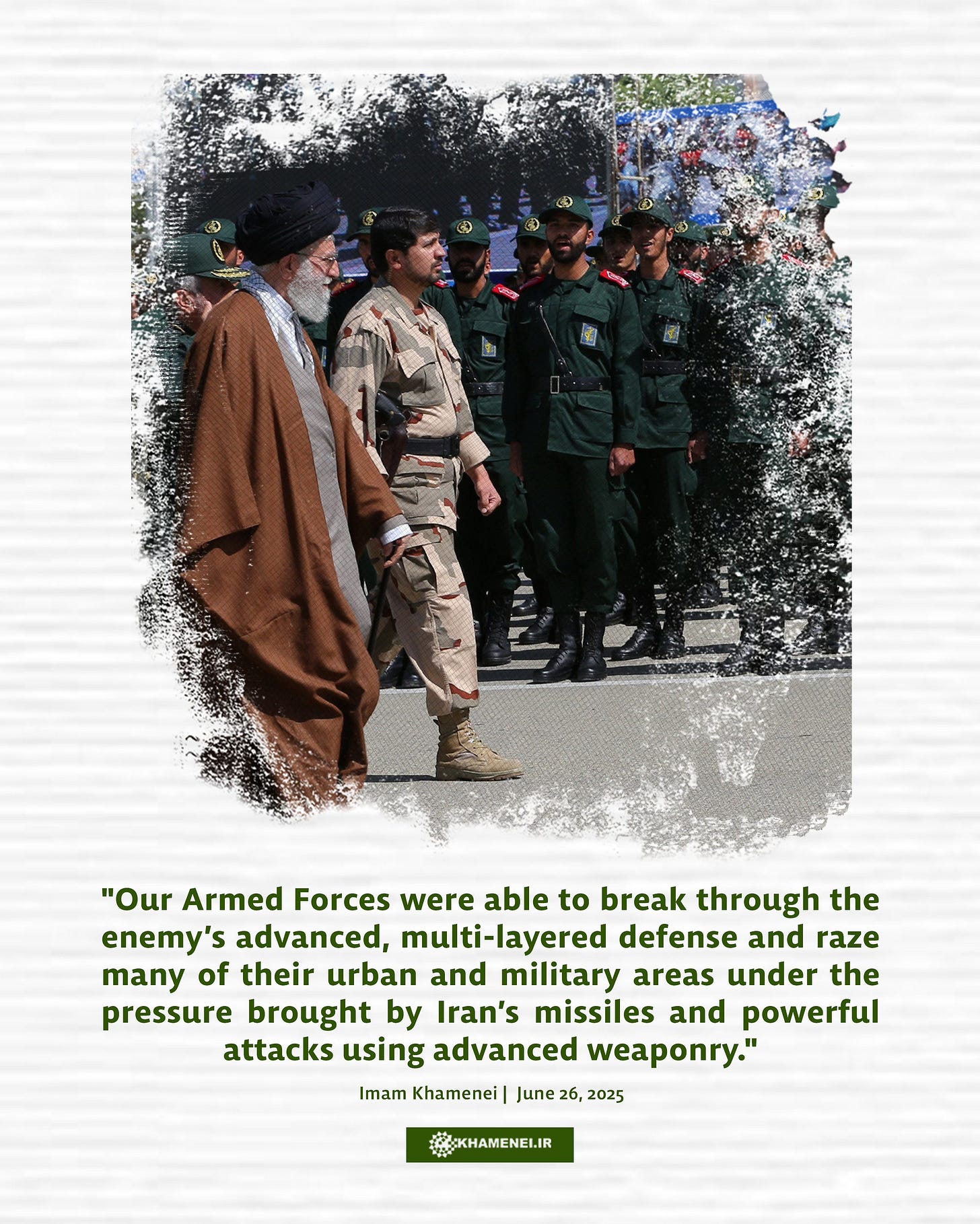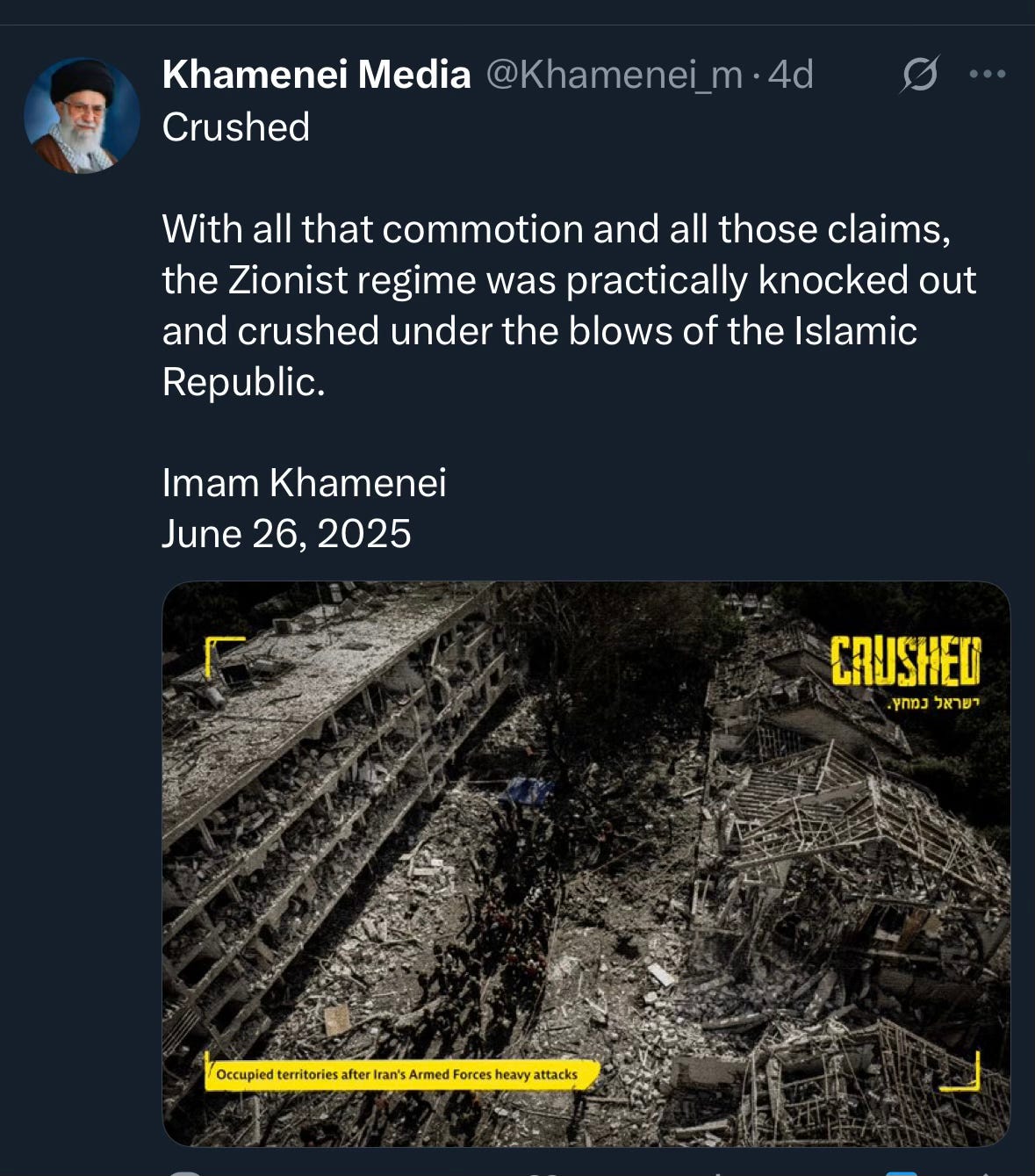Lies, damned lies...
The Fog of War and the Islamic Republic's battle to control the narrative
Says Darius the King: Thou that mayest be king after me, keep thyself utterly from lies. The man who may be a liar, him destroy utterly. If thou shall thus do, my country will remain in its integrity.1
As others have reminded us, the first casualty in war is the truth, and as soon as battle commences so does the fight to control the narrative. All states do it, but not all of them do it well. The Islamic Republic has traditionally been quite good at managing its narratives and seeking the moral high ground, minimising its provocations and maximising its grievances. And the current climate of misinformation can be viewed as fertile ground for Iran to manipulate. In the absence of moral clarity there is all to play for. Yet even here the Islamic Republic appears determined to overplay its hand.
Israel’s assault on 13th June was in many ways low hanging fruit as far as mastering such narratives were concerned although the effectiveness of the attack was in danger of muddying this process. Iranians and non-Iranians alike were stunned at both the comprehensiveness of the offensive, and the widespread penetration of Iran’s security apparatus. This was all the more galling because in the past year a succession of Iranian officials - many of whom fell victim to the initial onslaught - were publicly bragging about Iran’s lock-tight security and the might of its military capabilities. It was inconceivable, they protested, that Israel would dare to try and attack Iran.
More sanguine observers who warned that Iran’s senior military officials approached war with Israel as if it were some game on ‘playstation’, were swiftly sidelined and the lessons of last year’s encounters - notably that of October 2024 - ignored. Defined by the carefully curated memory of the Iran-Iraq war, Iran’s leaders had no real appreciation of what modern air warfare would look like.
Their bombast was swiftly exposed as little more than hot air but the speed at which Iran’s air defences were dismantled, shocked even the many Iranians who had been inured to years of government mendacity. This was staggeringly bad, even by their standards, and when the Iranian government issued a denial at having broken Trump’s ceasefire, this was swiftly denounced as a ‘lie’ by Iranians filming the launch. For those who had come to believe the myth of the Islamic Republic as an emerging regional (super) power the consequences were even more disconcerting.
The reassuring antidote to all this - at least for the believers - was to deny it and double down on a narrative that had been constructed before the conflict so rudely exposed it. The first thing to do, (as Mark Urban has shown here), was to declare, contrary to all the evidence, that you have won a great victory. Once this has been established, initial failures of the country’s air defences can be explained by underhand behaviour (and at least in one case an allegation of sorcery)2 adding for good measure that in fact, Iran’s defences are in the best shape they have ever been.
Victory is defined variously from having forced the United States and Israel to the negotiating table - not only did America ‘plead’ for talks, but the Israelis ‘begged’ the United States to ‘bail’ them out- to simply having survived. Indeed, given the general confusion over US-Israeli war aims - ‘regime change’ / ‘unconditional surrender’ - there were some easy points to be scored.
The ‘collateral damage’ that has inevitably accompanied Israel’s attacks has unsurprisingly triggered an angry response among Iranians which the regime has had no difficulty exploiting. Among the more egregious attacks was the targeting of the notorious Evin Prison, intended to blow open the doors, but instead hitting the main building resulting in widespread casualties. The assassination of a nuclear scientist along with his entire extended family (including children) was also gratuitous and contradicted the declared intention of avoiding civilian casualties. Almost before the first bombs landed, the regime was quick to stress that the attacks were ‘mainly’ targeted against ‘women and children’, and in such cases, Israel did the heavy lifting for them.
At the same time the regime has not been shy about proclaiming its own devastating response. Israel’s own natural coyness about the damage Iran has inflicted has again played into the regime’s hands and as information has come out, the emphasis is placed on what ‘remains hidden’. Any Israeli commentary that suggests this may be the case is naturally seized upon.
The evidence so far is that there has been substantive damage to parts of Tel Aviv (28 confirmed deaths and some 15,000 Israelis left homeless) seven industrial sites and 5 military targets (there is naturally little evidence of what if anything was struck at these sites). The percentage of missiles that got through is not much different to last year’s attacks although the duration and intensity this time round was greater and there is little doubt that the attacks on infrastructure have caused some consternation in Israel. There is however little indication that this altered Israel’s military calculus.3
To claim, as Khamenei’s office has done, that the ‘12 days war’ gave Iran the opportunity to test Israel’s defences for vulnerabilities, is a masterclass in spin. To add that such vulnerabilities were then exploited to ‘raze’ many urban and military areas, effectively ‘knocking out’ Israel, suggests a surfeit of conceit.
Of course, this also suggests, given the self-proclaimed accuracy of Iran’s missiles, that Iran had no qualms itself about hitting civilian targets, a view echoed by this Iranian commentator who appeared to take pride in the fact that Iran had turned Tel Aviv into a ‘war-zone’ like Gaza, a boast that nonplussed the BBC interviewer4:
The alternative, and more likely assessment, suggested by another Israeli commentator, that civilian damage was the result of the inaccuracy of Iran’s missiles has been ignored by pro-regime pundits because that does not reinforce the narrative of a ‘ferocious’ military power.
Another development that has clearly rankled was the lack of any palpable allies. This again should have been apparent last year as the one ally that Iran thought it could rely on - Russia - fell somewhat short of the expected commitment. This time round, Putin went even further in seeming to sympathise with Israel. China, meanwhile, who has clear interests in ensuring the flow of oil, has maintained a studied neutrality. Khamenei has nonetheless turned this absence of material support into a virtue by claiming that the ‘people’ of the world stood by Iran.
The one area in which the regime has been especially sensitive is on ‘national’ unity and it has been quick to suggest that the people have rallied round the flag, indulging in extensive flag waving of its own. Some of this is undoubtedly true and can be seen as the natural reaction to a trauma and, as I have noted elsewhere, the adrenaline rush that conflict tends to engender among a society under attack. There is nothing new in the regime’s apparent epiphany for all things national and pre-Islamic. Such motifs are regularly rolled out in times of crisis, though the scale on this occasion reflects the depth of the crisis. But ‘national solidarity’ is hard to reconcile with the level of Israeli penetration at the highest levels of the regime, or indeed with the absence of basic civil defence (shelters) for the ordinary population. The level of repression now being reported does not denote a political society at ease with itself.
The political logic of all this is clear but its deployment is too sudden and overblown to be anything more than crass (even desperate) political opportunism - Dr Johnson’s observation springs to mind. This is not society erupting in a fit of national solidarity but a regime fishing for allies among those it has hitherto marginalised, dismissed and suppressed. As Iranians are quick to point out such narratives need to hold in good times as well as bad and there need to be some practical consequences. To suddenly wheel out popular nationalist anthems of the Pahlavi era, (though in some cases even regime outlets have misidentified the anthem being sung) when you have spent so much time rubbishing that era, lacks credibility. To sing it at a traditional Shia mourning ceremony, as more than one wit has pointed out, seems strangely apposite.

Iranians are well aware that all governments are ‘economical with the truth’, not least those of the West. But the scale of the untruths - not least on social media where AI appears to have been press-ganged into service with a frequency matched only by the ease with which it can be exposed - is undermining whatever message the Islamic Republic is attempting to convey. Its only purpose can be to reassure the base, sceptics will not be persuaded and will only be reinforced in their view that the regime is inherently dishonest.
The Islamic Republic is in danger of giving mendacity a bad name…
Darius the Great as recorded in the Bisitun Inscription c500BC. Iranians are fond of quoting the ancient King’s prayer to Ahura Mazda to protect the people from the Lie.
Khamenei has notoriously claimed that foreign spy agencies use the black arts and work with ‘jinns’ to do their dastardly work. See for example, https://x.com/hafezeh_tarikhi/status/1943231677033013381?s=61&t=SITO72PsYuGvRtKjU3sO1A
The more likely influence would have been reported shortages of interceptors for the missile defence system. Khamenei’s office unsurprisingly picked up on reporting in the WSJ on this.
I am grateful to Holly Dagres for bringing this clip to my attention








Good points and well considered. We made some similar and additional ones here earlier this month:
https://open.substack.com/pub/kavehsforge/p/the-sound-of-truth?utm_source=share&utm_medium=android&r=45p8fq
Even on Substack, there are clearly regime accounts telling anyone who will listen that Iran have won a great victory…